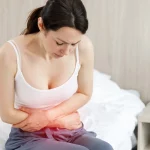
Key facts
- Vaginal bleeding normally occurs about once a month during your menstrual period.
- Bleeding between periods can also happen.
- See your doctor if you have heavy periods, bleeding between periods, bleeding after sex or bleeding after menopause.
What is vaginal bleeding?
Most females experience vaginal bleeding each month during their menstrual periods. Periods last an average of 5 days, but can last for up to 8 days.
Bleeding from the vagina is also possible at other times.
If you notice blood coming from your vagina at other times, or you are bleeding during your period in a way which makes you concerned, you should see your doctor.
When can vaginal bleeding happen?
Vaginal bleeding is usually due to periods, but can also happen at other times.
Periods
So-called ‘normal’ vaginal bleeding varies widely and can be different for you at different stages of your life.
Menstrual periods usually happen about once a month — approximately every 21 to 35 days.
Irregular periods
Teenagers and females approaching menopause are more likely to have irregular periods. That means that the gap between periods:
- may be shorter than usual (less than 21 days)
- may be longer than usual (more than 35 days)
- may change from month to month
Sometimes stressful life events can cause you to have irregular periods or skip a period entirely.
Heavy periods
It can be difficult to know if your periods are heavy. Your period shouldn’t interrupt your daily activities such as going to school or work, or make you feel stressed or anxious.
Signs of heavy periods include:
- having to change your tampon or pad every hour
- bleeding or ‘flooding’ that is not contained by a thick pad
- having to change your pad during the night
- bleeding through your clothes
- bleeding for more than 8 days
- passing clots (clumps of blood) bigger than a 50-cent piece
Talk with your doctor if you are worried about heavy periods.
Bleeding between periods
Bleeding between periods is also called ‘intermenstrual bleeding’.
There are many possible causes for bleeding between periods. You should speak to your doctor if you bleed between periods as it can occasionally signal something serious.
Vaginal bleeding after sex
Bleeding after having sex should always be discussed with your doctor, regardless of your age.
Vaginal bleeding after menopause
If you have vaginal bleeding after menopause, it’s important to see your doctor.
Vaginal bleeding during pregnancy
Bleeding during early pregnancy is common.
In some cases, a very early miscarriage or an ectopic pregnancy (when a fertilised egg grows outside of the womb) can cause vaginal bleeding without you knowing that you were pregnant.
If you bleed from the vagina at any time during pregnancy, you should always immediately contact your midwife or doctor.
What can cause vaginal bleeding between periods?
A lot of things can cause bleeding between periods, including:
- changes to your hormone levels during perimenopause (the stage of life leading up to your last menstrual period)
- using hormonal contraception
- infections, including sexually transmitted infections (STIs)
- some conditions affecting the female reproductive system
- some conditions that affect blood clotting
Can medicines cause vaginal bleeding?
Some medicines and types of contraception can cause vaginal bleeding.
Hormonal contraception
Vaginal bleeding or spotting (light bleeding) is common when you start using some types of hormonal contraception (for example, a hormonal intrauterine device). If it does not go away or is bothering you, talk to your doctor.
Some types of hormonal contraception can also cause the frequency and heaviness of your periods to change.
Menopausal hormone therapy (MHT)
Menopausal hormone therapy, also called hormone replacement therapy (HRT) can sometimes cause irregular bleeding. You should check with your doctor if you have bleeding while taking MHT.
Blood thinners
Some medicines, such as anticoagulants (‘blood thinners’) can make you more likely to have heavy periods.
If you are taking an anticoagulant and are experiencing vaginal bleeding, you should speak to your doctor right away. Do not stop taking any prescribed medicines unless your doctor advises you to.
When should I see a doctor about vaginal bleeding?
See your doctor about vaginal bleeding if:
- you are having vaginal bleeding between periods
- you bleed after having sex
- there is a chance you could be pregnant
- you have been through menopause
You should also see your doctor if:
- your periods are heavy
- you feel unwell, sick or dizzy because of your period
- you have an unusual vaginal discharge along with your period
- you have a fever or experience pain with your period
How can the cause of abnormal vaginal bleeding be diagnosed?
Your doctor will ask you about your symptoms and your periods. They may also ask whether you could be pregnant.
Your doctor will likely do a physical examination. They might:
- feel your tummy
- do an internal examination
- check your cervix (the entrance to the womb) using a medical device called a speculum
They may recommend tests such as:
- a swab of your vagina and cervix to test for infections and abnormal cells
- a pregnancy test
- an ultrasound scan, which may include a vaginal ultrasound
You doctor may also refer you to a gynaecologist — a medical doctor who specialises in female health.
How is vaginal bleeding treated?
Treatment for vaginal bleeding will depend on the cause. Your doctor will be able to give you advice depending on your situation.



